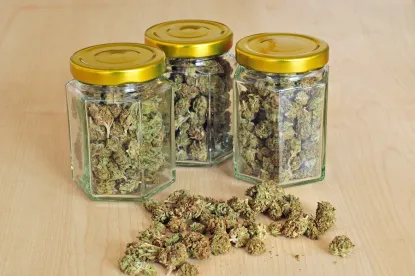In an important new decision, the Massachusetts Supreme Judicial Court recently held that a qualifying patient who has been terminated from employment for testing positive for marijuana as a result of her lawful medical marijuana use may state a claim of disability discrimination under that state’s anti-discrimination statute. As we blogged with respect to a after a similar decision in Rhode Island, this holding has significant implications for employers that drug test for marijuana use because 29 states plus the District of Columbia have enacted legislation legalizing medical and/or recreational marijuana use.
Background
The plaintiff received an offer of employment conditioned on her passing a mandatory drug test. Before taking the test, the plaintiff told her would-be supervisor that she would test positive for marijuana because she was a qualifying medical marijuana patient under Massachusetts law and used marijuana to treat her Crohn’s disease and irritable bowel syndrome. The supervisor assured her that her medicinal use of marijuana would not be an issue with the company. After submitting a urine sample for the mandatory drug test, the plaintiff completed her first day of work without incident. At the conclusion of that day, however, she was terminated for testing positive for marijuana. She was told that the company did not consider whether the positive test was due to the lawful medicinal use of marijuana because it followed federal, not state, law.
Court’s Holding and Rationale
The Court rejected plaintiff’s claims under the Massachusetts medical marijuana act, finding there to be no private right of action under the statute, which merely decriminalizes medical marijuana use and does not provide express employment protections. Nonetheless, the Court allowed to the plaintiff’s disability discrimination claim to proceed. In so holding, the Court rejected the employer’s arguments that the plaintiff could not be a qualified handicapped person under the statute because the only accommodation she sought (possession and use of marijuana) is a federal crime, and that the plaintiff was discharged because she tested positive for an illegal substance, not because of her disability.
Rather, the Court concluded that, at least in some circumstances, an employer may have an obligation to accommodate the off-duty use of marijuana for medicinal purposes. Like the Rhode Island trial court in Callaghan v. Darlington Fabrics Corporation, the Massachusetts Court determined that the medical marijuana act implicitly recognizes that off-site medical marijuana might be a permissible accommodation of an individual’s disability, and further concluded that the fact that marijuana may be illegal under federal law does not make it per se unreasonable as an accommodation.
The court rejected arguments that the federal classification of marijuana as a controlled, and thus illegal, substance should preempt the state law classification. First, the court noted that only the plaintiff, and not the employer, risked federal prosecution for using marijuana, and therefore the legality of its use should not impact a determination of its reasonableness as an accommodation. Second, the court concluded that to adopt the federal classification would be to improperly reject the determination of Massachusetts voters to legalize the drug for medical use.
Notably, just because the plaintiff may proceed on her disability discrimination claim does not mean she ultimately will succeed. This decision comes at the motion to dismiss stage, and the employer still has the opportunity to demonstrate on summary judgment or at trial that accommodating the plaintiff’s marijuana use would constitute an undue hardship.
Key Takeaways
This decision is the first in any state in which the applicable medical marijuana act merely decriminalizes to permit a disability discrimination claim to proceed on such facts. The decision calls into question whether, even in these states, employers may maintain zero tolerance marijuana testing policies. Prior to this year, decisions in other jurisdictions have held that employers operating in such jurisdictions may enforce such policies and take adverse action against medical marijuana users simply for testing positive. With claims in Rhode Island and now Massachusetts surviving motions to dismiss, these decisions may indicate a trend by courts to provide greater protections for lawful medical marijuana users.
Wherever employers operate, it is clear that they must take added precautions in administering their drug testing policies. While employers may continue to prohibit the on-duty use of or impairment by marijuana, employers must consider the following when testing for marijuana:
-
Employers should review their drug-testing policies to ensure that they (a) set clear expectations of employees; (b) provide justifications for the need for drug-testing; and (c) expressly allow for adverse action (including termination or refusal to hire) as a consequence of a positive drug test.
-
Employers may consider or be required to adjust or relax certain hiring policies to accommodate lawful medical marijuana users.
-
When an individual tests positive ostensibly because marijuana is used to treat a disability, employers, particularly those in Massachusetts, may be required to engage in the interactive process. First, however, employers should evaluate whether the individual has a qualified disability that warrants an accommodation and whether allowing the individual to use medicinal marijuana would allow rather than hinder the individual’s ability to perform the essential functions of the job.
-
Employers concerned with the application of federal law may, during the interactive process, explore whether another equally effective medical alternatives to marijuana use may enable the individual to perform the essential functions of the job. Note, however, employers in states requiring accommodation of medical marijuana use may be prohibited from exploring these alternatives.
-
Where no such alternative exists or can be agreed upon, employers who cannot accommodate even lawful, off-duty medicinal marijuana use must be prepared to demonstrate that such accommodation would constitute an undue hardship.
-
Any such decision should be well-documented and well-coordinated by the relevant stakeholders.
-
In any case, hiring managers should be trained not to provide assurances as to whether and how marijuana use may be accommodated. If an applicant or employee discloses marijuana use, that disclosure should immediately be referred to Human Resources and addressed by a Human Resources professional in coordination with counsel.
Clearly, employers enforcing zero-tolerance policies should be prepared for future challenges to such policies. In Massachusetts as well as in those states prohibiting discrimination against and/or requiring accommodation of medical marijuana users, such challenges are now more likely to survive a motion to dismiss.




 />i
/>i

